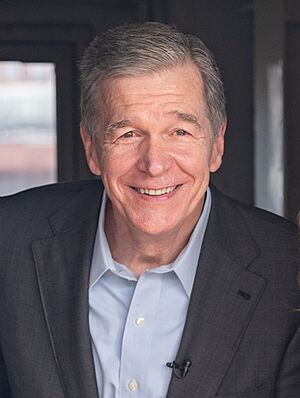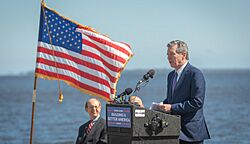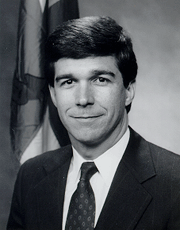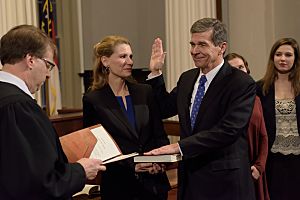Roy Cooper facts for kids
Quick facts for kids
Roy Cooper
|
|
|---|---|

Cooper in 2023
|
|
| 75th Governor of North Carolina | |
| In office January 1, 2017 – January 1, 2025 |
|
| Lieutenant | Dan Forest Mark Robinson |
| Preceded by | Pat McCrory |
| Succeeded by | Josh Stein |
| 50th Attorney General of North Carolina | |
| In office January 6, 2001 – January 1, 2017 |
|
| Governor |
|
| Preceded by | Mike Easley |
| Succeeded by | Josh Stein |
| Majority Leader of the North Carolina Senate | |
| In office July 17, 1997 – January 1, 2001 |
|
| Preceded by | Richard Conder |
| Succeeded by | Tony Rand |
| Member of the North Carolina Senate from the 10th district |
|
| In office February 21, 1991 – January 1, 2001 |
|
| Preceded by | Jim Ezzell |
| Succeeded by | A. B. Swindell |
| Member of the North Carolina House of Representatives from the 72nd district |
|
| In office February 9, 1987 – February 21, 1991 |
|
| Preceded by | Allen Barbee |
| Succeeded by | Edward McGee |
| Personal details | |
| Born |
Roy Asberry Cooper III
June 13, 1957 Nashville, North Carolina, U.S. |
| Political party | Democratic |
| Spouse |
Kristin Bernhardt
(m. 1992) |
| Children | 3 |
| Education | University of North Carolina, Chapel Hill (BA, JD) |
| Signature |  |
Roy Asberry Cooper III (born June 13, 1957) is an American politician and lawyer. He served as the 75th Governor of North Carolina from 2017 to 2025. Before becoming governor, he was the 50th Attorney General of North Carolina from 2001 to 2017. He also served in the North Carolina General Assembly, which is the state's lawmaking body, from 1987 to 2001.
Cooper graduated from the University of North Carolina at Chapel Hill in 1979. He started his career as a lawyer. In 1986, he was elected to the North Carolina House of Representatives. In 1991, he became a member of the North Carolina Senate, where he served until 2001. He was elected North Carolina Attorney General in 2000 and won reelection three more times. He held this job for almost 16 years, which is the longest time anyone has served as attorney general in North Carolina's history.
In 2016, Cooper ran for governor and won against the Republican governor, Pat McCrory. This was a big deal because he was the first person to defeat a sitting governor in North Carolina. He was reelected in 2020. Even though the state legislature tried to reduce the governor's power before he took office, Cooper worked to increase funding for education and healthcare. A major success was expanding Medicaid, which helps more people get health insurance.
| Top - 0-9 A B C D E F G H I J K L M N O P Q R S T U V W X Y Z |
Roy Cooper's Early Life and Education
Roy Asberry Cooper III was born in Nashville, North Carolina, on June 13, 1957. His mother, Beverly Thorne, was a teacher, and his father, Roy Asberry Cooper II, was a lawyer and a political advisor. Roy Cooper grew up working on his parents' tobacco farm during the summer.
He went to public schools and graduated from Northern Nash High School in 1975. While in high school, he was chosen to represent Nash County in the Youth Legislative Assembly.
College and Law School
Cooper received a special scholarship called the Morehead Scholarship to attend the University of North Carolina at Chapel Hill. During college, he was president of the university's Young Democrats club. He then went on to earn a law degree from the University of North Carolina School of Law in 1982. A law degree is called a Juris Doctor (JD).
Roy Cooper's Early Career in Law and Politics
While still in law school, Governor Jim Hunt appointed Cooper to an advisory group called the State Goals and Policy Board. This group helped set goals for the state. Cooper was the youngest person ever to serve on this board.
In 1982, Cooper joined a law firm in Nashville, North Carolina, where his father had also worked. Three years later, he became a partner in the firm.
Serving in the State Legislature
In 1985, Cooper decided to run for the North Carolina House of Representatives. He won the election and started serving in 1987. While in the House, he continued to work as a lawyer. He was known as a very effective new representative.
In 1991, a state senator passed away, and Cooper was appointed to fill his spot in the North Carolina Senate. He served in the Senate until 2001. During his time there, he helped pass laws that:
- Made it harder for minors to bring guns to school.
- Made public records easier to access.
- Strengthened laws about public meetings.
- Gave the governor more power to reject bills (called "veto power").
In 1997, he became the Majority Leader of the Senate, which is an important leadership role.
Roy Cooper as North Carolina Attorney General
Becoming Attorney General
In 2000, Roy Cooper decided to run for North Carolina Attorney General. The Attorney General is the state's chief legal officer, like the main lawyer for the state government. He won the election and took office on January 6, 2001. He was reelected three more times in 2004, 2008, and 2012. He served for almost 16 years, which is the longest time anyone has held that position in North Carolina.
Key Actions as Attorney General
- Helping Students: In 2001, Cooper helped create new programs to mentor and tutor middle and high school students who were suspended from school.
- Investigating Wrongdoing: In 2007, his office took over a difficult case involving the Duke lacrosse team. After finding that the prosecutor had hidden evidence, Cooper dismissed the case and declared the players "innocent." This decision was praised by many.
- School Safety: After a tragic school shooting in 2007, Cooper created a task force to study school shootings and suggest ways to prevent them. This led to a law requiring certain mental health records to be added to a gun permit database.
- Reviewing Old Cases: In 2010, Cooper ordered a review of cases handled by the State Bureau of Investigation's forensic lab. This happened after it was found that some officials had hidden important information, which led to people being wrongly convicted. His audit helped uncover many cases that needed to be re-examined.
- Supreme Court Case: In 2011, Cooper argued his first case before the United States Supreme Court. The case was about the rights of young people during police questioning.
Roy Cooper as Governor of North Carolina
Winning the Governor's Race
In 2016, Cooper ran for Governor of North Carolina against the current governor, Pat McCrory. A controversial law called "House Bill 2" had been passed, which caused many businesses to stop investing in the state. Cooper spoke out against this law.
The election was very close, but Cooper won by a small number of votes. He became the first person in North Carolina's history to defeat a sitting governor. He was reelected for a second term in 2020.
Starting His Term as Governor
Roy Cooper became governor on January 1, 2017. Before he took office, the state legislature passed some laws to reduce the governor's power. However, Cooper continued to focus on his goals.
One of his first actions was to ask for federal approval to expand Medicaid coverage in North Carolina. This program helps provide health insurance to low-income people. After many years of effort, Cooper signed a law in March 2023 that finally expanded Medicaid in the state, making over 600,000 more North Carolinians eligible.
Important Laws and Actions as Governor
- Driver Education: Cooper signed a bill that added lessons to driver's education about what to do when pulled over by law enforcement.
- School Bus Safety: In 2017, he signed a bill to put cameras on school buses to catch drivers who illegally pass stopped buses.
- COVID-19 Response: In 2020, Cooper created a task force to prepare North Carolina for the COVID-19 pandemic. He declared a state of emergency, banned large gatherings, closed schools, and later required face masks in public places to help slow the spread of the virus.
- Budget and Vetoes: During his first two years, the legislature often had enough votes to override his vetoes (meaning they could pass a bill even if he rejected it). However, after the 2018 elections, the legislature lost some seats, giving Cooper more power to negotiate and prevent bills he disagreed with from becoming law. He proposed budgets that included pay raises for teachers and state workers and funding for Medicaid expansion.

Leaving Office
Roy Cooper's term as governor ended on January 1, 2025. On December 31, 2024, his last day in office, he changed the sentences of 15 inmates who were on North Carolina's death row. Josh Stein became the new governor after him.
Roy Cooper's Personal Life
Roy Cooper is married to Kristin Cooper, who worked to help foster children. They have three daughters, all of whom also graduated from the University of North Carolina at Chapel Hill.
Cooper has taught Sunday school and is a big fan of the NHL hockey team, the Carolina Hurricanes. He has also accepted a teaching position at Harvard University.
How to Say His Last Name
In 2023, Roy Cooper shared that his last name, "Cooper," is actually pronounced with the "oo" sound like in "foot," not like the "oo" in "moon," which is how most people say it. He explained that the "foot" pronunciation is common in Eastern North Carolina, where he grew up. He said he is fine with people using either pronunciation.
Images for kids
-
Attorney General Roy Cooper (second from the left) standing behind President Barack Obama as he delivers a speech, February 2012
-
Cooper and former U.S. Representative Tim Valentine in August 2014
-
Governor Cooper, Lieutenant Governor Dan Forest and Senator Thom Tillis meet with President Donald Trump, September 2018
-
Cooper walking with U.S. Transportation Secretary Pete Buttigieg in 2023
See also
 In Spanish: Roy Cooper para niños
In Spanish: Roy Cooper para niños
 | Aaron Henry |
 | T. R. M. Howard |
 | Jesse Jackson |









